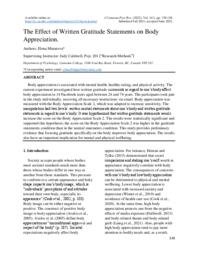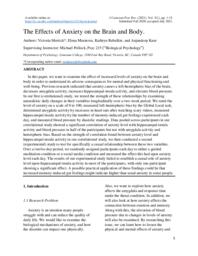Elena Muratova
Person Preferred Name
(none provided) (none provided)
Related Works
Content type
Digital Document
Description / Synopsis
Body appreciation is associated with mental health, healthy eating, and physical activity. The current experiment investigated how written gratitude statements in regard to one’s body affect body appreciation in 14 Facebook users aged between 24 and 74 years. The participants took part in the study individually, receiving all necessary instructions via email. Body appreciation was measured with the Body Appreciation Scale 2, which was adapted to increase sensitivity. The manipulation had two levels: written neutral statements about one’s body and written gratitude statements in regard to one’s body. It was hypothesized that written gratitude statements would increase the score on the Body Appreciation Scale 2. The results were statistically significant and supported this hypothesis; the score on the Body Appreciation Scale 2 was higher in the gratitude statements condition than in the neutral statements condition. This study provides preliminary evidence that focusing gratitude specifically on the body improves body appreciation. The results also have an important implication for mental and physical wellbeing.
Origin Information
Content type
Digital Document
Description / Synopsis
In this paper, we want to examine the effect of increased levels of anxiety on the brain and body in order to understand its adverse consequences for mental and physical functioning and well-being. Previous research indicated that anxiety causes a left-hemispheric bias of the brain, decreases amygdala activity, increases hippocampal-insula activity, and elevates blood pressure. In our first (correlational) study, we tested the strength of these relationships by examining naturalistic daily changes in their variables longitudinally over a two-week period. We rated the level of anxiety on a scale of 0 to 100, measured left-hemispheric bias by the Global Local task, determined amygdala activity by increases in heart rate after watching scary videos, measured hippocampal-insula activity by the number of memory-induced gut feelings experienced each day, and measured blood pressure by diastolic readings. Data pooled across participants in our correlational study showed a significant correlation of anxiety level with hippocampal-insula activity and blood pressure in half of the participants but not with amygdala activity and hemispheric bias. Based on the strength of correlation found between anxiety level and hippocampal-insula activity in our correlational study, we then conducted a second (experimental) study to test for specifically a causal relationship between these two variables. Over a twelve-day period, we randomly assigned participants each day to either a guided meditation condition or a social media condition and measured the effect this had upon anxiety level each day. The results of our experimental study failed to establish a causal role of anxiety level upon hippocampal-insula activity in most of the participants, with only one participant showing a significant effect. A possible practical application of these findings could be that increased memory-induced gut feelings might indicate higher than usual anxiety in some people.
Origin Information

